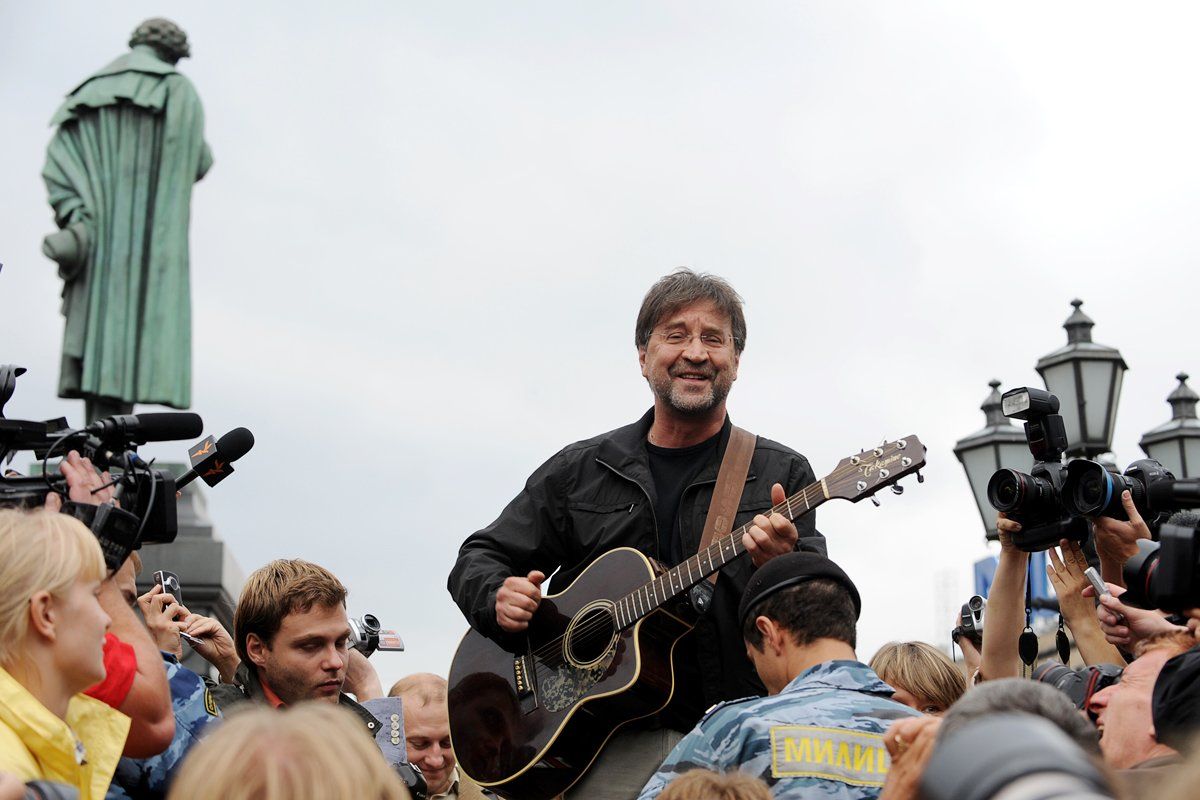
Rain poured over the crowd gathered for a rock concert in Moscow's central Pushkin Square last month. Police sealed off the square, searched everyone coming in, and infiltrated the crowd with plainclothes officers. The musicians were only slightly more obvious than the police. They could barely be seen, performing from a stepladder in the center of the crowd, and singing into a megaphone in place of loudspeakers. Moscow city hall did not permit them to use real microphones, because the authorities didn't want their message to be heard. This was a rare event in Russia: an anti-Putin rock-and-roll show.
Dubbed "We All Live in Khimki Forest," the concert, which featured eight different bands, was organized specifically to protest government construction of a road through a protected forest. But the message took on a much broader meaning. "God, so much truth shines in the eyes of the prostitute officials!" sang rocker Yuri Shevchuk in a deep, husky voice. "God, there is too much belief in retired executors/Do not let them roll up their sleeves again."
Many audience members carried children on their shoulders—something they wouldn't dare do at a traditional protest rally. Indeed, the police on security detail seemed confused. While they routinely break up opposition protests, they knew Shevchuk as the author of political anthems from the perestroika period—a sort of Russian Bruce Springsteen—and the leader of the popular band DDT. Earlier this year Shevchuk earned wide admiration for confronting Putin in an organized meeting with actors and artists on national TV: "What about freedom? Freedom of press, freedom of information? Because what is happening now looks more the feudal system we had a thousand years ago," he said, looking straight into Putin's eyes (the leader refused to engage). At the rally in Moscow, some cried, "Rock and roll lives!" when they saw Shevchuk climb the ladder to sing.
As the frenzy reached a crescendo, police blocked one band, Vezhlivy Otkaz (Polite Refusal), from entering the square and stopped other cars packed with concert gear. But the move backfired, emboldening Shevchuk to sing his next two songs standing atop a car. Toward the end of the show other performers improvised a stage using wood boards and a metal frame. Mariya Lyubicheva from Barto, a band influenced by the Sex Pistols, chanted her poetry without music: "Love is a protest. In the morning we warm up our hands against a cup of coffee, in the evening comes the arrest!"
Russia has rediscovered the political power of rock and roll. The scenes of police beating and detaining hundreds of protesters in recent months revived the sleeping musical movement that was a real force in the late Soviet period. The rock-and-roll energy that inspired perestroika and later the Orange Revolution in Ukraine has emerged with a vengeance in Putin's Russia. Young artists respond to everything from corruption to pollution with protest songs. "These are not a small bunch of long-suffering and constantly detained opposition party leaders, but young, dynamic, happy, and successful artists outraged by the corruption and ugliness of this regime," says music critic Artemy Troitsky. "They should scare the rulers more than anything else."
Their newfound power derives largely from their waning dependence on the state. Unlike 10 years ago, today's musicians can channel their protest songs through the Internet. In the past month alone, more than 100,000 Russian users have watched the video for the pop song "Matematika," by TV star Katya Gordon, which includes the line "Somebody up there should have understood a long time ago that freedom cannot be taken away from us." In the video, Gordon's lip is bleeding, as if recently beaten by police, and her musicians are covered with red paint—a protest against police disbanding the so-called 31 rallies, held on months with a 31st day, to mark the 31 articles in the Russian constitution that are supposed to guarantee freedom of assembly.
Rap and rock groups are using the Internet to publish songs addressing all manner of social ills; many are posted on oppositionmusic.ru. Last February a car carrying a business tycoon and the vice president of the oil company Lukoil allegedly drove on the wrong side of the road, killing two women. A few weeks later, the rap group Noize MC released a video clip of "Mercedes S666," in which lead singer Ivan Alexeyev assumes the voice of the Lukoil vice president and suggests that his "longtime friend Vova" Putin helped him escape punishment. When Moscow residents were forced to wear masks this summer after the capital was choked by black smoke from nearby fires, rapper Vis Vitalis responded with his "Gas Chamber" song: "There is no foundation in this house, guys! That is why half of the country is covered in smoke!"
The rock and roll appears to be having an impact. At the Pushkin Square concert 3,000 people signed a petition demanding that the government halt the logging of Khimki Forest—a project Putin blessed a few years ago. Soon after, President Dmitry Medvedev ordered a stop to the logging. In a radio poll, 96 percent of listeners said they believed that Medvedev was moved to act by the music fans.
Uncommon Knowledge
Newsweek is committed to challenging conventional wisdom and finding connections in the search for common ground.
Newsweek is committed to challenging conventional wisdom and finding connections in the search for common ground.
About the writer
To read how Newsweek uses AI as a newsroom tool, Click here.






